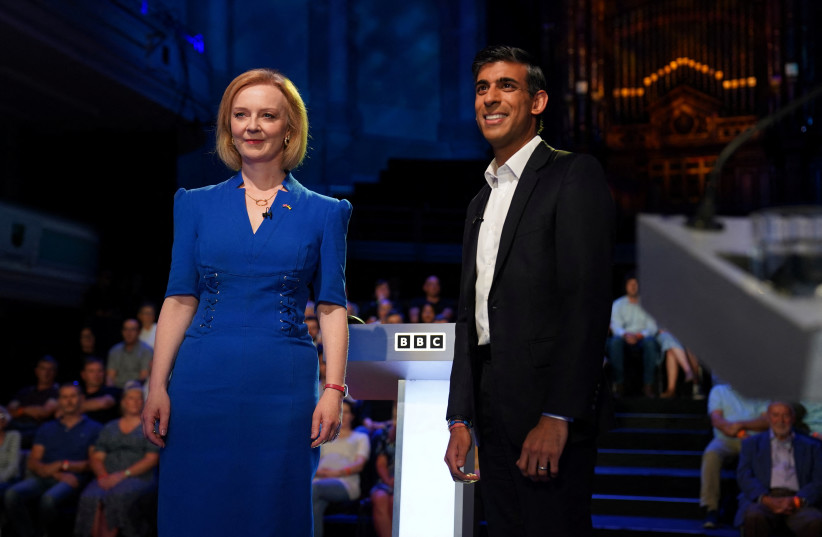Rishi Sunak and Liz Truss are fighting for the next position as leader of the Conservative Party, replacing Prime Minister Boris Johnson in September. The winner will gain the role of the prime minister of the United Kingdom until the next scheduled general election in January 2025, or until a snap election, if one is called.
For more stories from The Media Line go to themedialine.org
The leadership contest has sparked competition from both candidates over pledging their commitments toward Israel and the British Jewish community.
With letters to Conservative Friends of Israel (CFI), a British parliamentary lobby, both candidates have pledged to continue to grow the UK-Israel relationship.
What do Liz Truss, Rishi Sunak think about Israel?
Liz Truss wrote, “I pledge to renew my commitment to CFI and the UK’s Jewish community … not just because of CFI’s support but because it is the right thing to do,” further promising to consider moving the British Embassy from Tel Aviv to Jerusalem if she is elected.
Rishi Sunak declared he was “proud to be a friend of Israel and … to have served in a government that has elevated the UK-Israel relationship to its strongest position.” Both candidates promised to counter Iran’s nuclear activities, secure a UK-Israel Free Trade Agreement, and maintain the 2019 Conservative Manifesto commitment to combat the anti-Israel boycott, divestment, and sanctions movement.

“We’ve moved from friendship to partnership. And I would expect that partnership to continue.”
Joan Ryan
The Media Line spoke with Joan Ryan, UK executive director of the European Leadership Network, who sees both Conservative candidates as strengthening future UK-Israel relations. Ryan said, “Liz Truss has a long history of support for Israel and the Jewish community throughout her political career,” elaborating that Truss’ dedication to cultivating the UK’s relationship with Israel has been displayed by her close relationship with Israeli Prime Minister Yair Lapid throughout her career as international trade secretary and foreign secretary.
Ryan commented that Truss’ work on the trade deal has changed UK-Israel relations: “We’ve moved from friendship to partnership. And I would expect that partnership to continue.”
Speaking on Rishi Sunak, Ryan commented, “The things he has said and done have been very supportive. When he was a minister of local government, he was very solid on stopping local councils [from advancing BDS measures against Israel]. … As chancellor of the exchequer, he’s had a solid relationship with [Avigdor] Liberman,” his Israeli counterpart.
Richard Pater, Israel director of British Israel Communications and Research Centre, agreed, saying both candidates are “solidly in the pro-Israel camp.” Pater told The Media Line that Truss and Sunak had recognized the need to reach out for further trade deals with Israel.
What is the real significance for UK-Israel ties?
Dr. Toby Greene, a post-doctoral fellow at the Hebrew University’s Israel Institute, told The Media Line, “The real significance of this leadership race for UK-Israel relations is what effect it will have on who will win the next general election.”
Greene explained that if the general population did not like the Conservatives’ pick for PM and if the Labour party then won the next general election, it would have “a significant impact on UK-Israel relations.” Greene indicated that the Labour party appears committed
To recognize Palestine as a state would have a disruptive effect on UK-Israel relations.
“The relations between the Labour party and the British Jewish community were in a terrible state under [Jeremy] Corbyn. … Under the leadership of Sir Keir Starmer, the situation is much better, but the Jewish community is still aware that those currents and those trends still exist within the Labour party so that is a big worry.”
Dr. Toby Greene
The UK Labour Party: Critical of Israel, burdened by antisemitism claims
The Labour party has a history of highly critical views on Israel and has recently faced major claims of antisemitism, tarnishing its relationship with British Jews.
Greene added, “The relations between the Labour party and the British Jewish community were in a terrible state under [Jeremy] Corbyn. … Under the leadership of Sir Keir Starmer, the situation is much better, but the Jewish community is still aware that those currents and those trends still exist within the Labour party so that is a big worry.”
Asked if the British Jewish vote would impact the Conservative leadership result, Greene commented that despite the community being small in number among the 160,000 Conservative Party members, there are a reasonable number of Jewish Conservatives who will have an effect on the result. Greene added, “In this leadership election, you can see this in the interviews with both candidates in the Jewish press; you can also see them writing op-eds in the Jewish press” reflecting an acknowledgment from both candidates of the Jewish community’s potential voting impact.
Why the UK needs Israel
The Media Line asked Joan Ryan why it was important for the UK to further strengthen its relationship with Israel. Ryan explained, “The UK needs Israel right now, especially post-Brexit which has magnified the relationship in terms of trade, as clearly, the UK needs to form trade deals around the globe and in the Middle East.”
With the country in a state of political turmoil, rampant inflation, and an energy crisis exacerbated by the Russo-Ukrainian War, the Conservative candidates are looking toward Israel to deepen their trade relations in a post-Brexit epoch.
Isla-Rose Deans is a student at the University of Leeds and an intern in The Media Line’s Press and Policy Student Program
